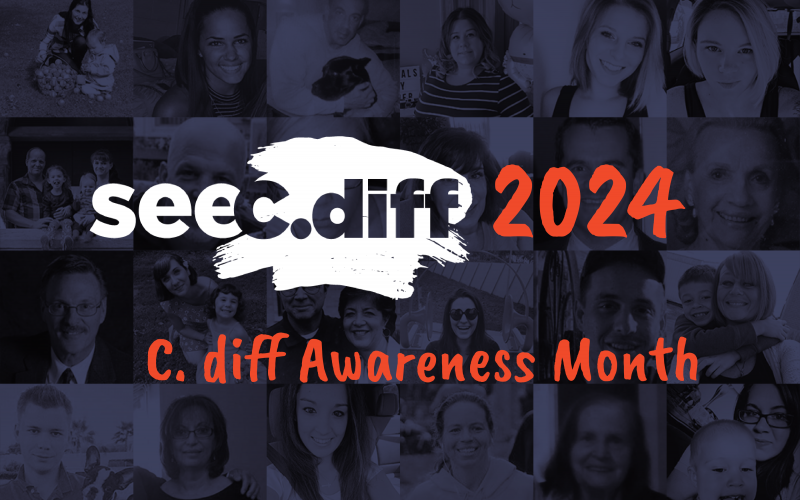FDA Public Hearing on Fecal Transplantation to treat C. diff
Other Categories
Delivered by Christian John Lillis | November 4, 2019
Judy Dexter, aged 70
Donald M, aged 52
Arnie Stone, aged 87
Richard Croke, aged 48
Mary Regina Beerman, aged 85
Edith, aged 92
Josephine, aged 79
Robert H, aged 73
Gail Mimnaugh, aged 64
Joe Tardibuono, aged 51
Peggy Lillis, aged 56
My name is Christian John Lillis. I’m the co-founder of the Peggy Lillis Foundation. All the people I have named died from a C. diff infection over the past decade. Some, like my mother died before FMT was in widespread use. But others have died since – either because it was not offered in time or it wasn’t performed properly. They represent tens of thousands of Americans who die every year from this largely treatable infection. For comparison, more people die now from C. diff than from HIV/AIDS, drunk drivers, or MRSA.
We started PLF in response to my mother’s death in April 2010. FMT for C. diff was in its infancy. By the time the source of her infection was diagnosed FMT would likely not have saved her. We have watched as its use has proliferated. We were excited that a treatment was finally available for the 20% of C. diff sufferers who do not respond to antibiotic therapy. We were happy about the rise of biotech companies seeking to take fecal transplant to the next level with defined, cultured microbial therapies. We have relationships with many of these companies as we have with both provider-run and independent stool banks.
We should be absolutely clear that no one wants a fecal transplant. The sheer desperation it takes for someone to agree to have the poop of another person transplanted into their body is mind boggling. But had FMT been an option for my mother back in 2010, I would have asked the doctors for a bedpan, a blender and some privacy. We have always seen FMT as an intermediary step while we develop safe and effective microbial formulations that can be stably grown. But I’m frustrated that it’s taken over 6 years and three draft guidance to get us this far.
I’m also angry. I’ve been angry every day since my mother died 9 ½ years ago. I’m also angry that 6 years after FDA released its first draft guidance, you’re still collecting data. Worse, it continues to be presented as just a question of science. But public policy is a moral and ethical pursuit. From the military to housing to drug approval, we constantly weigh the potential benefits against the likely risks through an ethical and moral lens.
FDA has updated its draft guidance twice. The 2014 update illustrates where science stops, and policymaking begins. In it, providers were told to use a donor known to themselves or the recipient. What’s the scientific basis for that? There isn’t one. Just as there is no scientific reason why I, a healthy, adult man, who’s been with my husband for nearly 18 years, cannot donate blood. I could if we abstained from sex for a year. Again, where’s the scientific explanation? If married heterosexuals had to abstain for a year to give blood you’d see a near cessation of donations. Since very few people would forego sex for a year JUST so they can donate blood, it’s a de facto ban.
There’s a similar dynamic with the gay blood ban and the lack of progress in regulating FMT. Though gay people have won broad acceptance since HIV led to the blood ban, the same cannot be said of feces. There is no pro-poo lobby, spending millions of dollars so people have access to it. In fact, I can tell you most C. diff survivors don’t even want to discuss this shit. But we have to, both here in the realm of public policy and more broadly, so people are aware of C. diff.
To do so, we need FDA to be more forthcoming. Following the FMT safety alert in June, on the death of an immune-compromised recipient, lots of folks panicked. We heard people who were set to get an FMT that they were now afraid to. I know of at least two doctors who stopped providing FMT because testing is cost-prohibitive. For 139 days FDA provided scant details. No information on the disease being treated, the status of the patients, the facility where the breach happened. Nothing.
Then on Wednesday a thorough, but somewhat self-serving, article was published in the New England Journal of Medicine. I bristled when I read Dr. Elizabeth Hohmann say she and her colleagues wanted to “set the record straight.” With respect to Dr. Hohmann, it is not up to her whether half a million people suffering from C. diff are given the necessary information to make an informed decision on FMT. It’s FDA’s job. Mass General has no right to keep this information from the public. And you have no right to sit on it.
Since 2013, an estimated 150,000 people have died from C. diff. How many deaths were prevented by the increased access of FMT? We don’t know for certain, but I’d guess at least several thousand. Whatever regulations you ultimately finalize and enforce, must take into account two things: The need to move microbiome therapies beyond fecal transplant as it’s currently practiced. And the need to maintain access to FMT for patients who need it.
So how do we thread this needle?
The answer is Patients. I’m not sure how many of you were at FDA during the explosion of AIDS activism in the late 80s. Back then FDA was even less adept at engaging patients but ACT-UP fought to be listened to; to have a seat at the table and be part of developing the policies to guide their treatment and permit them access to drugs. When ACT-UP was shutting down highways, and egging the façade of FDA’s buildings, I know that was disruptive. But people were fighting for their lives and it opened the space for so many advances in HIV medicine.
A former microbiome executive told me in the early 90s, the Pharma company he worked for was regularly targeted by ACT-UP. He hated it. Why were these AIDS activists yelling at him and his colleagues? Didn’t they understand that everyone was working as fast as they could? In hindsight, he told me, he realized those activists were the best allies his company could have had. They made sure that FDA, CDC and NIH all got more funding. In fact, many of the policies we’re currently using to speed microbiome development have their roots in AIDS advocacy.
I know you mean well. I know that you’re overworked and understaffed. That’s why PLF advocates every year to secure more funding and resources for FDA, CDC and NIH. I know that everyone in this room is here because you want to help end this epidemic. But where C. diff and FMT is concerned, FDA has done a crap job of including patients. This is the third FMT-related public hearing but only the first where a C. diff survivor is on the actual agenda. And the first time I, as an advocate, am on the agenda. That should not have taken 6 years. In that six years, how many times have you had a public hearing where the majority of testimony came from C. diff survivors? How many times have you solicited input from C. diff survivors?
I understand that technically this is a public meeting. And I do, genuinely, appreciate the effort made to invite me and Catherine. It’s a good start but it’s not enough. We need you to do better, not just on FMT, but on all C. diff treatments. As you know, and for good reasons, companies that are in the process of developing treatments cannot engage the patients in their clinical trials. But we do. PLF has more than 40 active and trained advocates and nearly 1,000 families and patients in our network. You could engage these people to obtain the real-world experiences of C. diff patients, which should guide policy just as much as scientific evidence.
By the time I get back to Brooklyn tonight, I will have spent about $600 to be here. And, if I wasn’t the head of a C. diff-related nonprofit, I would have had to take the day off from work. 63% of families do not have $500 to cover an unanticipated emergency, let alone come to Silver Spring, Maryland for a public meeting. But you can bring them here.
Organizing around infectious diseases is difficult because they tend to be acute. People either recover or they die. Most people do not embrace an identify around them as many do around being a cancer survivor. Adding to the difficulty is that most people – some 70% – have never heard of C. diff, despite it being the most common healthcare associated infection. C. diff infections are a national emergency. Though we’ve made some progress in reducing hospital acquired cases, it’s growing in the community, among people who have no idea the dangers they’re facing. But we do.
I realize I’ve been a bit harsh. I hope you take it as the tough love that I intend. The future of FMT development has to include robust engagement with the patients and families on the frontline of the C. diff epidemic. You can make that happen. So do it for Judy and Joey and Gail and Donald and Betty and Peggy.
Thank you.



Thank you for this message to the FDA. As to the last paragraph, you haven’t been one bit too harsh. Thank you for courageously and intelligently speaking up. You clearly had a mother who encouraged you to work for a better country. Many thanks from Medical Error Transparency Plan Facebook Group.
Thank you for standing up to the FDA about FMT. I developed C Diff at the age of 75. Within a year I had it 3 times, lost 25 lbs., suffered severe abdominal pain and diarrhea which left me home bound for a year. It was extremely debilitating and depressing. I spent over a thousand dollars for different medications specifically for C Diff that didn’t work. After seeking a second opinion from another GI doctor, she immediately suggested a FMT. I did not have a family member that qualified to be a donor so the doctor used a stool bank. I had the procedure and within a few weeks I was free of pain and diarrhea. I started to get my life back again. No one knows the horrors of C Diff infection unless you’ve had it or knows of someone who suffered with it. I’m thankful for people like you who advocate for this horrible infection.
Christian Lillis and Peggy Lillis Foundation have been a research lifeline for me in my patient advocacy and as a Healthcare Safety Consumer Representative in Texas. You are accurate in reminding FDA that harmed patients do not show up at public hearings because of travel costs and inability to travel while ill/handicapped. Harmed patients and their advocates can be their best allies. Keep telling the truth. We are listening!